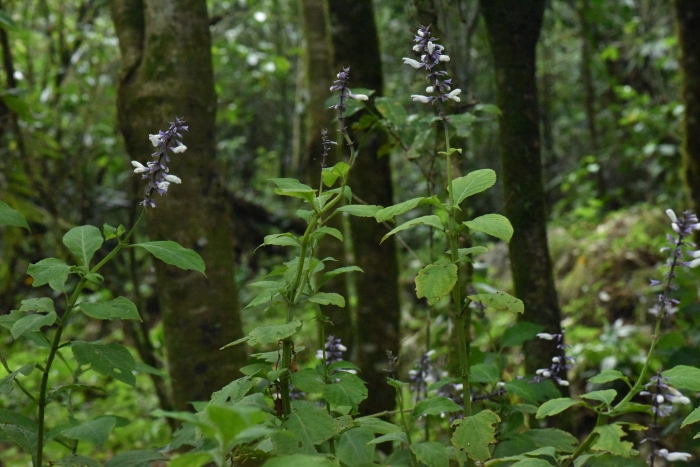Diviner’s Sage
(Salvia divinorum)
Diviner’s Sage (Salvia divinorum)
/
/

© Alan Rockefeller
CC BY 4.0
Image By:
© Alan Rockefeller
Recorded By:
Copyright:
CC BY 4.0
Copyright Notice:
Photo by: © Alan Rockefeller | License Type: CC BY 4.0 | License URL: http://creativecommons.org/licenses/by/4.0/ | Uploader: alan_rockefeller | Publisher: iNaturalist |

























Estimated Native Range
Summary
Salvia divinorum, commonly known as Diviner’s Sage, is a perennial herb that is native to the moist and shaded cloud forests of the Sierra Mazateca in Oaxaca, Mexico. It thrives in the understory of these high-altitude regions, where it is part of a unique ecosystem that includes a variety of other shade-loving plants. Salvia divinorum typically grows to a height of 3 feet (0.9 meters) and can spread out to about the same width. It has large, ovate, green leaves and produces small white flowers with purple calyces during the summer months. The flowers are not particularly showy, but they are interesting due to their association with the plant’s psychoactive properties.
Diviner’s Sage is valued for its ethnobotanical history and is primarily cultivated for medicinal and ritual uses. It is not commonly found in general horticulture but is of interest to those who appreciate ethnobotanical plants. In cultivation, it requires consistently moist soil, high humidity, and partial to full shade, mimicking its native cloud forest conditions. It is not drought-tolerant and can be sensitive to overexposure to direct sunlight. While it is not invasive, it can be sensitive to frost and may require protection in cooler climates. Salvia divinorum is not typically prone to diseases but can suffer from root rot if overwatered or planted in poorly draining soil.CC BY-SA 4.0
Diviner’s Sage is valued for its ethnobotanical history and is primarily cultivated for medicinal and ritual uses. It is not commonly found in general horticulture but is of interest to those who appreciate ethnobotanical plants. In cultivation, it requires consistently moist soil, high humidity, and partial to full shade, mimicking its native cloud forest conditions. It is not drought-tolerant and can be sensitive to overexposure to direct sunlight. While it is not invasive, it can be sensitive to frost and may require protection in cooler climates. Salvia divinorum is not typically prone to diseases but can suffer from root rot if overwatered or planted in poorly draining soil.CC BY-SA 4.0
Plant Description
- Plant Type: Herb
- Height: 3-6 feet
- Width: 2-3 feet
- Growth Rate: Moderate
- Flower Color: White
- Flowering Season: Summer
- Leaf Retention: Deciduous
Growth Requirements
- Sun: Part Shade, Full Shade
- Water: Medium
- Drainage: Medium
Common Uses
Edible*Disclaimer: Easyscape's listed plant edibility is for informational use. Always verify the safety and proper identification of any plant before consumption., Potted Plant
Natural Habitat
Moist and shaded cloud forests of the Sierra Mazateca in Oaxaca, Mexico
Other Names
Common Names: Sage of the Diviners, Salvia, Divining Sage, Herb-Of-The-Virgin, Yerba De La Pastora, Seer’s Sage
Scientific Names: , Salvia divinorum,
GBIF Accepted Name: